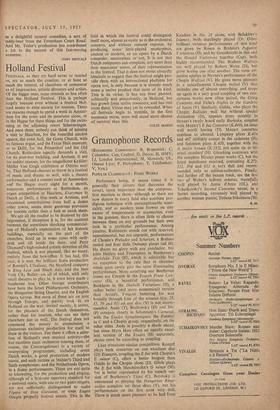Holland Festival
FESTIVALS, as they try hard never to remind us, are as much the creation, or at least as much the interest, of chambers of commerce as of impresarios, artistic directors and artists. Of the bigger ones, none reminds us less often than the Holland Festival. This is perhaps largely because even without a festival Hol- land seems to exist mainly for tourists. There are reasons enough to spend a week in Amster- dam for the town and its museums alone, or in the Hague for these things and for the swim- ming at the adjoining resort Scheveningen. And once there, nobody can think of missing a visit to Haarlem, for the beautiful market square, the town hall, the Great Church, with its famous organ, and the Frans Hals museum'. or to Delft, for the Prinsenhof and the Old Church. Rotterdam equally demands a visit, for its post-war building, and Arnhem, if not for sadder reasons, for the magnificent Kroner- Miler Van Gogh exhibition at Otterlo near by. That Holland chooses to throw in a festival of music and drama as well, with a theatre performance and a concert each at Amsterdam and the Hague every night for a month, numerous performances at Rotterdam, an organ competition at Haarlem, Everyman in Dutch at Delft, a film week at Arnhem, and occasional contributions from half a dozen other towns, seems sheer generous provision for tourists rather than a bait to catch them.
We are all the readier to be deceived by this impression, if deception it is, for the contrast between the sometimes shocking commercial- ism of Holland's exploitation of her historic buildings, especially on the part of the churches, fitted up in some cases with cash- desk and till inside the door, and Peter Diamand's high-minded artistic direction of the festival, which is not planned, like so many, entirely from the box-office. It has had, this year, it is true, the brilliant Scala production of Rossini's L'haliana, the Stratford company in King Lear and Much Ado, and the New York City Ballet—on all of which, with only small theatres to play in, it must have made a handsome loss, Other foreign contributors have been the Israel Philharmonic Orcheitra, the Hungarian String Quartet, and the English Opera Group. But most of „these are on tour through Europe, and merely look in on Holland on the way, invited mainly, it seems, for the pleasure of the Dutch themselves,, rather than for tourists, who can see them elsewhere just as well. The festival does not command the money to commission a glamorous exclusive production for itself to draw in the visitors. For them it offers a selec- tion of Holland's own musical activity—the five excellent main orchestras (among them, of course, the Concertgebouw) in a variety of enterprising programmes, including seven Dutch works, a good proportion of modern music, and such rarities as Mahler's Third and Sixth symphonies; and the Netherlands Opera, in a dozen performances. These are not quite so interesting, for the production and singing, although of a first-rate repertory standard for a national opera, with one or two guest singers, are not sufficiently distinguished to make Figaro or Don Giovanni, or even Eugen Onegin properly festival events. This is the
field in which the festival could distinguish itself more, almost as easily as in the orchestral concerts, and without ruinous expense, by producing some little-played masterpiece, ancient or modern, or an opera by a Dutch compoder, masterpiece or not. It is not that Dutch composers can complain, any more than their musicians' union, of their representation in the festival. That it does not seems absurdly idealistic to suggest that the festival might pro- vide them with an international platform for opera too, is only because it is already much more a native product that most of its kind. This is its virtue. It has not been planted, arbitrarily and precariously, in Holland, but has grown from native resources, and las real roots there. Virtue may yet be rewarded. When all festivals begin to tremble, in the first economic storm, none will stand More chance of survival than this.
COLIN MASON


































 Previous page
Previous page